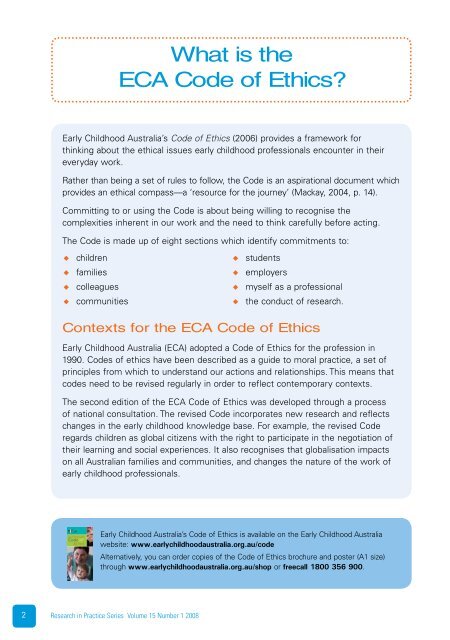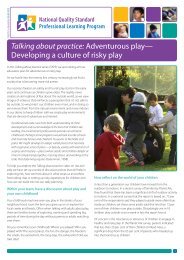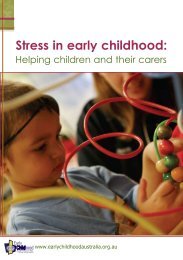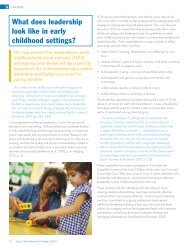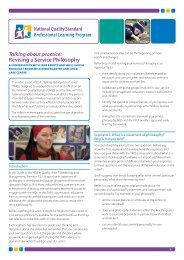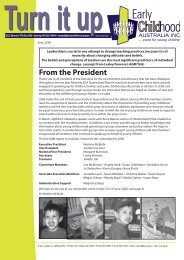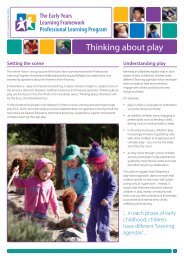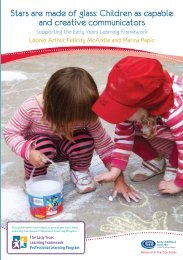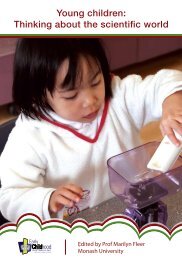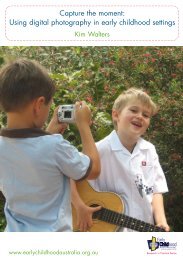The Code of Ethics - Early Childhood Australia
The Code of Ethics - Early Childhood Australia
The Code of Ethics - Early Childhood Australia
Create successful ePaper yourself
Turn your PDF publications into a flip-book with our unique Google optimized e-Paper software.
2<br />
What is the<br />
ECA <strong>Code</strong> <strong>of</strong> <strong>Ethics</strong>?<br />
<strong>Early</strong> <strong>Childhood</strong> <strong>Australia</strong>’s <strong>Code</strong> <strong>of</strong> <strong>Ethics</strong> (2006) provides a framework for<br />
thinking about the ethical issues early childhood pr<strong>of</strong>essionals encounter in their<br />
everyday work.<br />
Rather than being a set <strong>of</strong> rules to follow, the <strong>Code</strong> is an aspirational document which<br />
provides an ethical compass—a ‘resource for the journey’ (Mackay, 2004, p. 14).<br />
Committing to or using the <strong>Code</strong> is about being willing to recognise the<br />
complexities inherent in our work and the need to think carefully before acting.<br />
<strong>The</strong> <strong>Code</strong> is made up <strong>of</strong> eight sections which identify commitments to:<br />
◆<br />
◆<br />
◆<br />
◆<br />
children<br />
families<br />
colleagues<br />
communities<br />
Contexts for the ECA <strong>Code</strong> <strong>of</strong> <strong>Ethics</strong><br />
<strong>Early</strong> <strong>Childhood</strong> <strong>Australia</strong> (ECA) adopted a <strong>Code</strong> <strong>of</strong> <strong>Ethics</strong> for the pr<strong>of</strong>ession in<br />
1990. <strong>Code</strong>s <strong>of</strong> ethics have been described as a guide to moral practice, a set <strong>of</strong><br />
principles from which to understand our actions and relationships. This means that<br />
codes need to be revised regularly in order to reflect contemporary contexts.<br />
<strong>The</strong> second edition <strong>of</strong> the ECA <strong>Code</strong> <strong>of</strong> <strong>Ethics</strong> was developed through a process<br />
<strong>of</strong> national consultation. <strong>The</strong> revised <strong>Code</strong> incorporates new research and reflects<br />
changes in the early childhood knowledge base. For example, the revised <strong>Code</strong><br />
regards children as global citizens with the right to participate in the negotiation <strong>of</strong><br />
their learning and social experiences. It also recognises that globalisation impacts<br />
on all <strong>Australia</strong>n families and communities, and changes the nature <strong>of</strong> the work <strong>of</strong><br />
early childhood pr<strong>of</strong>essionals.<br />
Research in Practice Series Volume 15 Number 1 2008<br />
◆<br />
◆<br />
◆<br />
◆<br />
students<br />
employers<br />
myself as a pr<strong>of</strong>essional<br />
the conduct <strong>of</strong> research.<br />
<strong>Early</strong> <strong>Childhood</strong> <strong>Australia</strong>’s <strong>Code</strong> <strong>of</strong> <strong>Ethics</strong> is available on the <strong>Early</strong> <strong>Childhood</strong> <strong>Australia</strong><br />
website: www.earlychildhoodaustralia.org.au/code<br />
Alternatively, you can order copies <strong>of</strong> the <strong>Code</strong> <strong>of</strong> <strong>Ethics</strong> brochure and poster (A1 size)<br />
through www.earlychildhoodaustralia.org.au/shop or freecall 1800 356 900.


